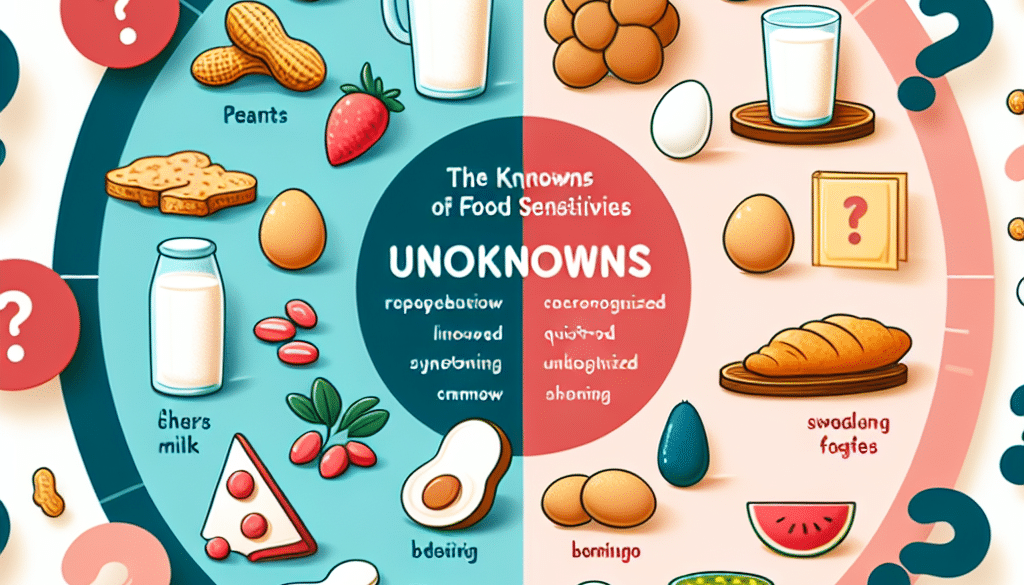The Knowns and Unknowns of Food Sensitivities
-
Table of Contents
- Food Sensitivities: Understanding the Knowns and Navigating the Unknowns
- What We Know About Food Sensitivities
- Common Food Sensitivities
- Diagnosis and Management
- The Unknowns of Food Sensitivities
- Challenges in Research and Diagnosis
- Psychological and Social Impacts
- Case Studies and Statistics
- Conclusion: Balancing Awareness and Caution
- ETChem’s Protein Products: A Solution for Those with Food Sensitivities
Food Sensitivities: Understanding the Knowns and Navigating the Unknowns
Food sensitivities are a complex and often misunderstood area of health and nutrition. Unlike food allergies, which can cause immediate and potentially life-threatening reactions, food sensitivities are usually less severe and can be more difficult to diagnose. This article delves into the knowns and unknowns of food sensitivities, exploring the symptoms, causes, and management strategies, as well as the challenges faced by individuals and healthcare providers.
What We Know About Food Sensitivities
Food sensitivities, also known as food intolerances, can lead to a variety of symptoms that affect individuals differently. Common symptoms include gastrointestinal issues such as bloating, gas, diarrhea, and constipation, as well as headaches, fatigue, and skin problems like eczema. Unlike food allergies, which involve the immune system producing IgE antibodies, food sensitivities often involve different immune system components or non-immunological mechanisms.
Common Food Sensitivities
- Lactose Intolerance: Difficulty digesting lactose, a sugar found in milk and dairy products.
- Gluten Sensitivity: Non-celiac gluten sensitivity can cause symptoms similar to celiac disease without the autoimmune response.
- FODMAPs: Some individuals have sensitivities to certain carbohydrates that can cause irritable bowel syndrome (IBS) symptoms.
- Chemical Sensitivities: Reactions to food additives like MSG, sulfites, and artificial colorings.
Diagnosis and Management
Diagnosing food sensitivities often involves an elimination diet, where suspected foods are removed from the diet and then gradually reintroduced to observe symptoms. Healthcare providers may also use tests like the Mediator Release Test (MRT) or the ALCAT test, although these are not universally accepted due to variability in results.
Management of food sensitivities typically involves avoiding trigger foods, which can be challenging given the prevalence of certain ingredients in processed foods. Nutritional counseling and support from dietitians can be crucial in maintaining a balanced diet while eliminating problem foods.
The Unknowns of Food Sensitivities
Despite increased awareness, there are still many unknowns surrounding food sensitivities. The mechanisms behind non-IgE-mediated food sensitivities are not fully understood, and there is no single test that can reliably diagnose all food sensitivities. This can lead to misdiagnosis or individuals unnecessarily cutting out nutritious foods from their diets.
Challenges in Research and Diagnosis
Research into food sensitivities is ongoing, but the lack of standardized diagnostic criteria and the subjective nature of symptoms make it difficult. There is also a need for more reliable biomarkers that can be used in testing and diagnosis.
Psychological and Social Impacts
The psychological and social impacts of food sensitivities are often overlooked. The stress of managing a restrictive diet and the fear of accidental exposure to trigger foods can affect mental health and quality of life. Social situations involving food can become challenging, leading to isolation or anxiety.
Case Studies and Statistics
Case studies have shown that individuals with food sensitivities can experience significant improvements in their symptoms and quality of life when trigger foods are identified and managed properly. For example, a study on patients with IBS who followed a low-FODMAP diet showed a marked reduction in symptoms.
Statistics indicate that food sensitivities are more common than previously thought, with some estimates suggesting that up to 20% of the population may be affected to some degree. However, accurate prevalence rates are difficult to determine due to the variability in symptoms and lack of standardized testing.
Conclusion: Balancing Awareness and Caution
Understanding food sensitivities requires a balance of awareness and caution. While it’s important to recognize the impact of food sensitivities on health and well-being, it’s equally important to avoid unnecessary dietary restrictions without proper diagnosis and guidance. Collaboration between patients, healthcare providers, and nutrition experts is key to managing food sensitivities effectively.
ETChem’s Protein Products: A Solution for Those with Food Sensitivities
For individuals with food sensitivities, finding safe and suitable protein sources can be a challenge. ETChem’s range of protein products, including hypoallergenic options like marine and fish collagen, can be an excellent alternative for those who need to avoid common allergens like dairy or gluten. Their high-quality collagens are easily digestible and can be incorporated into various diets, ensuring that individuals with food sensitivities do not miss out on essential nutrients.
About ETChem:
ETChem, a reputable Chinese Collagen factory manufacturer and supplier, is renowned for producing, stocking, exporting, and delivering the highest quality collagens. They include marine collagen, fish collagen, bovine collagen, chicken collagen, type I collagen, type II collagen and type III collagen etc. Their offerings, characterized by a neutral taste, instant solubility attributes, cater to a diverse range of industries. They serve nutraceutical, pharmaceutical, cosmeceutical, veterinary, as well as food and beverage finished product distributors, traders, and manufacturers across Europe, USA, Canada, Australia, Thailand, Japan, Korea, Brazil, and Chile, among others.
ETChem specialization includes exporting and delivering tailor-made collagen powder and finished collagen nutritional supplements. Their extensive product range covers sectors like Food and Beverage, Sports Nutrition, Weight Management, Dietary Supplements, Health and Wellness Products, ensuring comprehensive solutions to meet all your protein needs.
As a trusted company by leading global food and beverage brands and Fortune 500 companies, ETChem reinforces China’s reputation in the global arena. For more information or to sample their products, please contact them and email karen(at)et-chem.com today.





